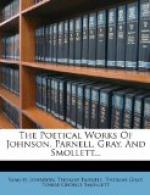[Footnote 2: ‘Lord-Keeper:’ Sir Christopher Hatton, promoted by Queen Elizabeth for his graceful person and fine dancing. Brawls were a sort of a figure-dance then in vogue.]
[Footnote 3: ‘Styack:’ the house-keeper.]
[Footnote 4: ‘Squib:’ the steward.’]
[Footnote 5: ‘Grooms:’ of the chamber.]
[Footnote 6: ‘Maclean:’ a famous highwayman, hanged the week before.]
[Footnote 7: ‘Hagged:’ i. e., the face of a witch or hag.]
* * * * *
ELEGY WRITTEN IN A COUNTRY CHURCHYARD.
1 The curfew tolls the knell of parting
day,
The lowing herd
wind slowly o’er the lea,
The ploughman homeward plods
his weary way,
And leaves the
world to darkness and to me.
2 Now fades the glimmering landscape on
the sight,
And all the air
a solemn stillness holds,
Save where the beetle wheels
his droning flight,
And drowsy tinklings
lull the distant folds:
3 Save that, from yonder ivy-mantled tower,
The moping owl
does to the moon complain
Of such as, wandering near
her secret bower,
Molest her ancient
solitary reign.
4 Beneath those rugged elms, that yew-tree’s
shade,
Where heaves the
turf in many a mouldering heap,
Each in his narrow cell for
ever laid,
The rude forefathers
of the hamlet sleep.
5 The breezy call of incense-breathing
Morn,
The swallow twittering
from the straw-built shed,
The cock’s shrill clarion,
or the echoing horn,
No more shall
rouse them from their lowly bed.
6 For them no more the blazing hearth
shall burn,
Or busy housewife
ply her evening care;
No children run to lisp their
sire’s return,
Or climb his knees,
the envied kiss to share.
7 Oft did the harvest to their sickle
yield,
Their furrow oft
the stubborn glebe has broke;
How jocund did they drive
their team afield!
How bow’d
the woods beneath their sturdy stroke!
8 Let not Ambition mock their useful toil,
Their homely joys,
and destiny obscure;
Nor Grandeur hear with a disdainful
smile
The short and
simple annals of the poor.
9 The boast of heraldry, the pomp of power,
And all that beauty,
all that wealth e’er gave,
Await alike the inevitable
hour:
The paths of glory
lead but to the grave.
10 Nor you, ye Proud! impute to these
the fault,
If Memory
o’er their tomb no trophies raise,
Where, through the long-drawn
aisle and fretted vault,
The pealing
anthem swells the note of praise.
11 Can storied urn or animated bust
Back to
its mansion call the fleeting breath?
Can Honour’s voice
provoke the silent dust,
Or Flattery
soothe the dull cold ear of death?




